Book contents
- Frontmatter
- Contents
- Foreword: Through Carroll's Looking Glass of Criticism
- Introduction
- 1 The Cabinet of Dr. Kracauer
- 2 Entr'acte, Paris and Dada
- 3 The Gold Rush
- 4 Keaton: Film Acting as Action
- 5 Buster Keaton, The General, and Visible Intelligibility
- 6 For God and Country
- 7 Lang, Pabst, and Sound
- 8 Notes on Dreyer's Vampyr
- 9 King Kong: Ape and Essence
- 10 Becky Sharp Takes Over
- 11 Interpreting Citizen Kane
- 12 The Moral Ecology of Melodrama: The Family Plot and Magnificent Obsession
- 13 Mind, Medium, and Metaphor in Harry Smith's Heaven and Earth Magic
- 14 Welles and Kafka
- 15 Nothing But a Man and The Cool World
- 16 Identity and Difference: From Ritual Symbolism to Condensation in Anger's Inauguration of the Pleasure Dome
- 17 Text of Light
- 18 Joan Jonas: Making the Image Visible
- 19 Introduction to Journeys from Berlin/1971
- 20 The Future of Allusion: Hollywood in the Seventies (and Beyond)
- 21 Back to Basics
- 22 Amy Taubin's Bag
- 23 Herzog, Presence, and Paradox
- 24 Film in the Age of Postmodernism
- Notes
- Index
19 - Introduction to Journeys from Berlin/1971
Published online by Cambridge University Press: 05 June 2012
- Frontmatter
- Contents
- Foreword: Through Carroll's Looking Glass of Criticism
- Introduction
- 1 The Cabinet of Dr. Kracauer
- 2 Entr'acte, Paris and Dada
- 3 The Gold Rush
- 4 Keaton: Film Acting as Action
- 5 Buster Keaton, The General, and Visible Intelligibility
- 6 For God and Country
- 7 Lang, Pabst, and Sound
- 8 Notes on Dreyer's Vampyr
- 9 King Kong: Ape and Essence
- 10 Becky Sharp Takes Over
- 11 Interpreting Citizen Kane
- 12 The Moral Ecology of Melodrama: The Family Plot and Magnificent Obsession
- 13 Mind, Medium, and Metaphor in Harry Smith's Heaven and Earth Magic
- 14 Welles and Kafka
- 15 Nothing But a Man and The Cool World
- 16 Identity and Difference: From Ritual Symbolism to Condensation in Anger's Inauguration of the Pleasure Dome
- 17 Text of Light
- 18 Joan Jonas: Making the Image Visible
- 19 Introduction to Journeys from Berlin/1971
- 20 The Future of Allusion: Hollywood in the Seventies (and Beyond)
- 21 Back to Basics
- 22 Amy Taubin's Bag
- 23 Herzog, Presence, and Paradox
- 24 Film in the Age of Postmodernism
- Notes
- Index
Summary
The period in which Structural Film (as distinct from Structuralist-Materialist Film) dominated the American avant-garde scene appears past. Attacks by sentimental humanists, on the one hand, and professorial marxists, on the other, are not causes of the decline of Structural Film but symptoms of what is already a fact. Structural Film is retiring from the field not because it lost the battle of ideas – if such a mishmash of amateur theorizing can be so called – but, more seriously, because it no longer crystalizes the attitudes, values and fantasies of the avant-garde intelligentsia. The image of the filmmaker as part cognitive psychologist, part mathematician, part chessplayer – the epitome of rarefied intellect – is no longer compelling, perhaps because the qualities it mimes and projects – including professional coolness, expertise with systems and technologies and controlled experimentalism – cannot, for all sorts of reasons, be regarded heroic in the way they were in the early seventies. The revived interest and attention given to documentaries and autobiographical film, as well as the appearance of the punk/no wave, indicate the displacement of Structural Film from the center to a corner of the American avant-garde arena.
If the tempo of anticipation and discussion at major New York strongholds of avant-garde film bears any resemblance to reality – a proposition many non-New Yorkers may greet with a hearty harumph – then the tendency pretending to or contending for the throne is what we might call The New Talkie (All Talking, Some Singing, Some Dancing).
- Type
- Chapter
- Information
- Interpreting the Moving Image , pp. 234 - 239Publisher: Cambridge University PressPrint publication year: 1998

